
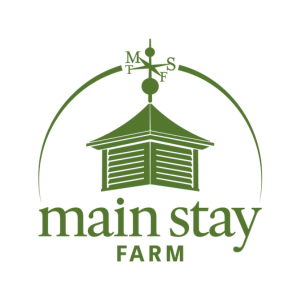
Main Stay Therapeutic Farm
6919 Keystone Road
RICHMOND, IL 60071
Mailing Address:
6919 Keystone Rd.
RICHMOND, IL 60071
Phone: 815-653-9374
MAKE AN INQUIRY
View our WEBSITE
EIN: 36-3565747Founded: 1987
View our PHOTO GALLERY
Profile Last Updated December 1, 2025Public Charity
Click here to view listing(s) of the program horses we are seeking

The Guardian Seal of Transparency is awarded annually to recognize an organization's commitment to transparency and accountability by their willingness to make comprehensive data about their programs, horse care practices, and governance available for public scrutiny. The Guardian Seal of Transparency is NOT an endorsement.
Last Updated: June 9, 2025
Main Stay Therapeutic Farm has not attained the Guardian designation for 2026.

MISSION & PROGRAMS
Mission:Main Stay’s mission is to enrich mind, body, and spirit through powerful connections with horses, animals, and nature. The organization fulfills this mission through a continuum of equine-assisted services, including therapeutic/adaptive riding and equine assisted learning. Its equine partners play a central role in fostering growth, connection, and skill development. Through purposeful, facilitated interactions, participants build physical strength, improve emotional regulation, develop communication and social skills, and experience meaningful successes. These programs support individuals with physical, developmental, emotional, and social challenges in a safe, inclusive, and empowering environment.
Our organization conducts Equine Assisted Services in accordance with the EQUUS Foundation Guidelines on Qualifications of Organizations Conducting Equine Assisted Services (EAS).
Our organization provides outreach and/or public education programs involving horses.
Over 90% of our total programs and services are equine-related.
Our organization is directly responsible for the care and shelter of equines involved in our programs.
Our organization does not CURRENTLY use satellite, overflow, foster, and/or outreach facilities.
Please describe what steps your organization takes to ensure that:
1) all interactions between your equines and people are mutually beneficial and conducted in accordance with the Guidelines for Human-Equine Interactions stated below;
2) all equines in the care of our organization and/or equines that participate in the organization's program have access to clean drinking water at all times; nutritious food in sufficient quantity, including natural forage such as pasture grass and/or hay; appropriate veterinary, farrier, and dental care; shelter and protection from the weather; sufficient safe space to move around comfortably on a daily basis; and daily opportunity to freely interact and have contact with other equines:
Main Stay is deeply committed to the health and well-being of all equines in its care. Every horse receives attentive, individualized care that supports both physical health and emotional well-being.
All equines at Main Stay have access to clean, fresh drinking water throughout the day. They are fed a balanced and nutritious diet, including high-quality hay and grazing pasture appropriate to individual nutritional needs. This ensures that each horse maintains optimal body condition and receives the nourishment required for a healthy life. Body index scores are measured routinely to adjust nutritional intake as needed.
Routine and preventive health care is a cornerstone of Main Stay’s equine management. Horses receive regular veterinary exams, vaccinations, dental care, and consistent farrier services. Any signs of discomfort, injury, or illness are addressed promptly in consultation with licensed professionals. Each horse’s well-being is monitored closely by staff members trained to recognize subtle changes in behavior or health.
In addition to these basic necessities, Main Stay provides safe, clean shelter and adequate protection from the elements. Horses have the freedom to move comfortably in safe, spacious environments, with opportunities for regular turnout and natural movement. Socialization is also a key component of care; all equines are given daily opportunities to freely interact with other horses, supporting their natural herd instincts and emotional health.
Main Stay goes beyond standard care by integrating a variety of supportive therapies designed to enhance the horses’ comfort, mobility, and overall quality of life. Horses may receive treatments such as BEMER blanket therapy, which promotes circulation and recovery; massage therapy to alleviate tension and improve muscle health; Masterson Method sessions, a gentle form of bodywork that helps relieve pain and increase range of motion; chiropractic care to support skeletal alignment; and MagnaWave pulsed electromagnetic field (PEMF) therapy, which aids in reducing inflammation and promoting healing. These services are provided by experienced practitioners and are tailored to meet the specific needs of each horse.
The horses at Main Stay are more than just animals in a program—they are trusted partners, compassionate companions, and an essential part of the organization’s mission. By providing high-quality care and thoughtful therapeutic support, Main Stay ensures that every equine is healthy, comfortable, and able to fully engage in the meaningful work they do with program participants.
Equine Assisted Services (EAS) Overview:
Overview of our programs involved with providing EAS to individuals with special needs:
For more than 30 years, Main Stay has provided therapeutic riding (TR), also known as Adaptive Riding (AR), and equine assisted learning (EAL) to individuals with physical, developmental, social and emotional challenges.
Adaptive riding helps clients with physical, developmental, cognitive and emotional disabilities by utilizing the movement of the horse to benefit the rider. Sessions teach horsemanship skills to the unique ability level of each rider and are specifically chosen to enhance learning, education and social skills. Clients who are overcoming extreme adversity, abuse or emotional trauma find healing at Main Stay. Main Stay is committed to providing individualized AR instruction to clients. AR lessons are conducted as private 30-minute lessons or semi-private 45-minute lessons - typically 2 but no greater than 4 riders. Some riders may spend additional time before or after the lesson assisting in preparation and care of their AR horse, this time is facilitated by the PATH instructor and supported by trained volunteers.
Main Stay conducts Equine-Interactive Learning: Academic and/or Vocational Learning in accordance with the EQUUS Foundation Guidelines. Our organization's equine and animal assisted learning (EAL) program provides learning activities to benefit a wide variety of clients. EAL can complement existing therapies provided by collaborating school and agency partners or stand alone as a valuable therapeutic learning model. At Main Stay, clients find a safe environment to learn in a calm setting with clearly outlined academic, social and emotional goals designed to improve and enhance daily living skills. EAL sessions are typically conducted for 1 1/2 hours once a week for 6-8 weeks with an average group size of 6 clients. All EAL sessions are administered by an EAL team comprised of a facilitator and an animal specialist.
Professional Development is offered through Main Stay's Harness the Power of the Team program. This program was created to offer a unique experiential learning opportunity outside the traditional office setting. Partnering with horses and animals inspires participants to explore opportunities for self-discovery, creativity, decision-making and delegating tasks to achieve a common goal. A reflection and de-briefing period allows learners time to assess behavior, consequences and concepts that can be translated back to your organization. This is a ground based, unmounted program.
All clients or groups have individualized lesson plans and goals. These goals are created in collaboration with: AR instructors or EAL facilitators, a consulting therapist, the client's own goals and desired interests, care givers, partner agency staff (where clients originate from), and educators. This strategy allows for maximum learning to benefit each client as determined in each personalized or group goal.
Vocational opportunities are offered to young adults, ages 18-22 who have completed high school graduation requirements but who continue to receive public school services based on their specialized Individual Education Plans (IEP). These clients work on personal life skills and workforce skills to improve their ability to function as independently as possible as adults. Students are supported during their vocational time through trained job coach mentors provided by the school district and trained volunteers who are supervised by Main Stay's Program Director. Vocational tasks include skills needed in the office, facility, gardening, special events, and animal husbandry sectors. Personal living skills are developed by utilizing unique areas of Main Stay's facility like a full kitchen, laundry room, and adaptive vegetable and herb garden.
Main Stay's Program Director, Jean Maraist, is an Occupational Therapist and registered PATH instructor who oversees all programming. Main Stay is a premier accredited PATH Intl. center, all adaptive riding lessons are taught by certified PATH instructors.
All equine and animal assisted learning sessions are facilitated and/or directly supervised by the EAL Program Manager who is a certified teacher, certified Cognitive Behavior Group Facilitator and PATH CTRI. The EAL program is managed full-time by certified teacher, Carla Kaizen, M.A. Education. Carla directly facilitates a majority of the EAL sessions while partnering with a trained animal specialist; and she helps to develop session plans and curriculum with fellow facilitators. The EAL facilitator's primary role in sessions is to guide clients in a wide variety of activities in order to meet the client's goals. The animal specialist role is primarily to ensure the safety of the animals and foster appropriate human-animal interactions (directly and indirectly).
In 2016, Main Stay completed construction of a 37,000 sq. foot state-of-the-art equine facility to further meet the growing needs for its services in the community. The multi-functional facility allows for overlapping AR and EAL programs to take place with a continued focus on meeting the needs of each client and group.
All instructors and facilitators are PATH Intl. certified or advanced Therapeutic Riding Instructors (CTRI). Additionally, 3 program staff hold degrees and certification in either Recreation Therapy, Occupational Therapy or K-12 education (advanced degree).
Clinical staff from collaborating agencies accompany groups during equine and animal assisted learning activities when appropriate.
Equine Assisted Services (EAS) and Providers:
Our organization provides the following Equine Assisted Services (EAS):
Adaptive/Therapeutic Riding
Adaptive/Therapeutic Unmounted Horsemanship
Equine-assisted Learning in Education
Equine-assisted Learning in Personal Development
9: Total number of Equine Assisted Service Providers at Main Stay Therapeutic Farm
1 Brittany Gianoni
FACILITY PARTICIPATION:
Main Stay Therapeutic Farm
RELATIONSHIP: Employee
SERVICES PROVIDED:
Adaptive/Therapeutic Riding
Adaptive/Therapeutic Unmounted Horsemanship
DEGREES, LICENSES AND/OR CERTIFICATIONS
PATH,Intl. Certified Therapeutic Riding Instructor, B.A. in Recreational therapy
2 Carla Kaizen
FACILITY PARTICIPATION:
Main Stay Therapeutic Farm
RELATIONSHIP: Employee
SERVICES PROVIDED:
Adaptive/Therapeutic Riding
Adaptive/Therapeutic Unmounted Horsemanship
Equine-assisted Learning in Education
Equine-assisted Learning in Personal Development
DEGREES, LICENSES AND/OR CERTIFICATIONS
PATH,Intl. CTRI Certified Therapeutic Riding Instructor, M.A. Education, Certified Teacher K-12, ESL/Bilingual endorsement, Strides to Success Registered HorseWork Facilitator, Certified Cognitive Group Behavior Facilitator
3 Haley Cronin
FACILITY PARTICIPATION:
Main Stay Therapeutic Farm
RELATIONSHIP: Employee
SERVICES PROVIDED:
Adaptive/Therapeutic Riding
Adaptive/Therapeutic Unmounted Horsemanship
DEGREES, LICENSES AND/OR CERTIFICATIONS
PATH Intl CTRI certified therapeutic riding instructor
B.S. Equestrian General Studies
M.B.A.
4 Jean Maraist
FACILITY PARTICIPATION:
Main Stay Therapeutic Farm
RELATIONSHIP: Employee
SERVICES PROVIDED:
Adaptive/Therapeutic Riding
Adaptive/Therapeutic Unmounted Horsemanship
Equine-assisted Learning in Personal Development
DEGREES, LICENSES AND/OR CERTIFICATIONS
PATH,Intl. Certified Therapeutic Riding Instructor, Occupational Therapist, Registered/Licensed, Strides to Success Registered HorseWork Facilitator
5 Joanne Mulvey
FACILITY PARTICIPATION:
Main Stay Therapeutic Farm
RELATIONSHIP: Employee
SERVICES PROVIDED:
Adaptive/Therapeutic Riding
Adaptive/Therapeutic Unmounted Horsemanship
DEGREES, LICENSES AND/OR CERTIFICATIONS
PATH,Intl. CTRI, Certified Therapeutic Riding Instructor
6 Mikki Connors
FACILITY PARTICIPATION:
Main Stay Therapeutic Farm
RELATIONSHIP: Employee
SERVICES PROVIDED:
Adaptive/Therapeutic Riding
Adaptive/Therapeutic Unmounted Horsemanship
DEGREES, LICENSES AND/OR CERTIFICATIONS
PATH,Intl. Certified Therapeutic Riding Instructor
7 Roxie Elliott-Crandall
FACILITY PARTICIPATION:
Main Stay Therapeutic Farm
RELATIONSHIP: Employee
SERVICES PROVIDED:
Adaptive/Therapeutic Riding
Adaptive/Therapeutic Unmounted Horsemanship
Equine-assisted Learning in Personal Development
DEGREES, LICENSES AND/OR CERTIFICATIONS
PATH,Intl. Certified Therapeutic Riding Instructor, PATH,Intl. Equine Specialist in Mental Health and Learning (ESMHL) Certified, Strides to Success Registered HorseWork Facilitator
8 Sarah Detloff
FACILITY PARTICIPATION:
Main Stay Therapeutic Farm
RELATIONSHIP: Employee
SERVICES PROVIDED:
Adaptive/Therapeutic Riding
Adaptive/Therapeutic Unmounted Horsemanship
DEGREES, LICENSES AND/OR CERTIFICATIONS
PATH Intl certified therapeutic riding instructor CTRI
9 Tina Kranz
FACILITY PARTICIPATION:
Main Stay Therapeutic Farm
RELATIONSHIP: Employee
SERVICES PROVIDED:
Adaptive/Therapeutic Riding
Adaptive/Therapeutic Unmounted Horsemanship
DEGREES, LICENSES AND/OR CERTIFICATIONS
PATH,Intl. Certified Therapeutic Riding Instructor
Registered HorseWork Facilitator
Outreach and/or Public Education:
Main Stay annually hosts workshops & clinics on various equine-related topics including health and horsemanship. These clinics and workshops are offered to those in the equine assisted services industry as well as to the public.
2024 workshops included saddle fit, as well as client specific training to best support the human-horse connection across all program areas. This focus on the horse-human connection, with special attention to the needs communicated by the horses, continues to be an organizational priority.
Main Stay hosted a regional PATH Intl. conference in February 2025 with training, workshops and discussions spanning 4 days.
Research/Medical Use of Equines:
Our organization has never made, and would not ever consider making, equines available for research studies or medical training that involves invasive procedures and/or that which may cause pain or suffering to the equine.
Religious Affiliation:
Our organization does not promote religious education, religious purposes, or a specific religious faith or use donations for religious education or religious purposes; require participants to be of a certain faith; require participation in religious, instruction, activities or services; or require participation in prayer, worship, religious instruction or other religious activities as a condition of receiving social or secular services offered.
Auction Donation:
Our organization has never allowed, or would not consider allowing, an equine to be sold, transferred, released, or otherwise placed into possession of any person or organization that would cause or allow the equine to be sold at auction for slaughter.
Our Programs/Activities that are not equine-related and/or involving animals other than equines:
Main Stay also offers an animal-assisted learning program which partners with horses as well as a mixed herd of small rescued farm animals (sheep, goats, miniature horses, donkey, mule), as well as rabbits and barn cats.
POLICIES: INTAKE, ASSESSMENT & TRAINING
Prior to a horse being accepted and/or arriving at the facility, the organization has the following policies in place:The owner of a potential equine is interviewed over the phone or in person prior to seeing the equine
The equine is evaluated at its place of residence
The owner completes an application/contract which constitutes the agreement between the owner and our organization when the equine is acquired from the equine's owner other than by seizure or by abandonment
If health records are not available or are out-of-date, our veterinarian will administer appropriate vaccinations
The owner is financially responsible for the shipping of the equine to and from the organization
A health certificate signed by a veterinarian and dated no more than seven days prior to arrival is provided to our organization either prior to or upon arrival of the equine attesting to the health status of the equine
Trial Period: Check all that apply:
Equines are on trial up to 60 days
The trial period may be reduced based on the equine's progress
During the trial period, the organization accepts financial responsibility for the care of the equine, including board, feed, shoeing and any necessary veterinary care, up to a fixed amount agreed upon by the organization and the owner
The trial period may be terminated by either the organization or the owner for any reason
Equines are on trial for up to 30 days
Equines are on trial for 60 or more days
During the trial period, the organization accepts total financial responsibility for the care of the equine, including board, feed, shoeing and any necessary veterinary care
During the trial period, the owner/donor is financially responsible for the care of the equine, including board, feed, shoeing and any necessary veterinary care
Upon intake, the organization has the following quarantine policy in place:
The equine is confined to a designated and separate area for isolation and quarantine at the facility for a prescribed period of time
The equine is confined to a designated and separate area for isolation and quarantine off-site for a prescribed period of time
The equine is not quarantined
The typical length of quarantine is: Up to 10 days
Following arrival of the equine at the facility, the following is performed:
Physical examination to include temperature, pulse and respiration by a trained staff member upon arrival
A Henneke Body Conditioning Score or other body conditioning score is assigned by a trained staff member upon arrival
Photographs are taken of each equine upon arrival at the facility and kept with the equine's health records
Physical examination to include temperature, pulse and respiration by a veterinarian upon arrival
A Henneke Body Conditioning Score or other body conditioning score is assigned by a veterinarian upon arrival
Physical examination by a farrier
Physical examination by a dentist
The equine is microchipped if the equine has not been microchipped
Horses are assessed for following skills and behaviors:
Retrieval from a pasture/paddock
Leading with a halter and lead rope
Temperament, disposition and attitude, such as rated from very calm to very high spirited
Saddling
Bridling
Lunging
Loading onto and unloading off a trailer
Mounting and dismounting
Riding at the walk
Riding at the trot
Riding at the canter
Riding by a beginner and/or unbalanced rider
Tolerance to unusual objects and loud noises
Known vices, i.e., cribbing, biting, kicking, weaving, stall walking, etc
Grooming
Tolerance to multiple handlers at the same time
Jumping
Driving (Pulling a carriage)
Bathing
Clipping
Our organization has the following policies and procedures in place pertaining to the ongoing assessment of horses in its care:
Physical examination by a veterinarian at least annually
The Henneke Body Condition score or other body conditioning score is updated at least annually by the veterinarian
Vaccinations are administered at least annually
Photographs are taken of each equine annually and kept with the equine's health records
Equines at our facility may be treated by an equine chiropractor
Equines at our facility may be treated by an equine acupuncturist
Equines at our facility may be treated by an equine massage therapist
Equines at our facility may be treated by an equine nutritionist
The Henneke Body Condition score or other body conditioning score is updated at least annually by a trained staff member
Photographs are taken of each equine monthly and kept with the equine's health records
Our organization has the following policies and procedures in place pertaining to the weight-carrying or workload capabilities of horses/equines that are ridden in our care:
Our organization evaluates the weight-carrying and workload limitations for each equine that is ridden at least annually
Our organization maintains a written record of the weight-carrying and workload limitations for each equine that is ridden
Our organization does not evaluate the weight-carrying and workload limitations for each equine that is ridden
No equines are ridden; not applicable
The following variables are considered in determining the weight-carrying and workload limitations for each equine that is ridden:
Equine age, weight, breed, body condition, fitness, balance, health and soundness
Equine conformation to include the top line, length of back, strength and width of loin, bone density (measured by the circumference of the cannon bone just below the knee)
Size, shape, condition and angle of the hooves
Participant weight, height, body proportions, balance, fitness and riding skills as well as behavioral issues and safety concerns
Weight and proper fit of the saddle and other equipment
Terrain and footing in the working environment
Duration and frequency of working sessions, as the frequency with which an equine is subjected to maximum weight carrying and/or workload
Nature and pace of work, repetitive or varied, radius of turns, degree of incline and regularity of footing when equine is subject to maximum weight-carrying capacity
Temperature and/or weather conditions
Seasonal impact on the equines' workload and weight-carrying capabilities and limitations
Our organization does not evaluate the weight-carrying and workload limitations for each equine that is ridden
No equines are ridden; not applicable
Horses provided formal training (groundwork or riding): 2-3 times per week
Additional information about our intake, assessment & training policies and practices:
The small equine utilized only in the equine and animal assisted learning program are not ridden so mounted assessments, including rider weight limit criteria, are not applicable for those specific equine.
As Main Stay isn't a rescue/rehab organization incoming equine have typically received appropriate care, including up to date coggins, vaccinations, etc... in order to be considered as potential program equine. If this isn't the case then additional procedures/protocol may be required by Main Stay, including a current health certificate. Main Stay is near the Wisconsin border, if a horse crosses state lines in order to come to our facility then a current health certificate plus Coggins is required per Wisconsin state regulations.
POLICIES: BREEDING
The organization has the following policies related to breeding and stallions:Our organization does not conduct breeding of equines owned or under the care of our organization.
Our main facility where our organization conducts its programs does NOT breed equines.
One or more of the facilities where our organization conducts its programs, including foster/temporary care facilities, breeds equines
One or more of the facilities where our organization conducts its programs, including foster/temporary care facilities, are permitted to house stallions
POLICIES: EUTHANASIA
The organization has the following policies related to euthanasia:Our organization will never have an equine euthanized for space
Our organization will have an equine euthanized upon the recommendation of the veterinarian if the equine is a threat to itself, other equines, or people
Our organization will have an equine euthanized upon the recommendation of the veterinarian after all reasonable treatment options have been explored
Euthanasia is done on site when possible to decrease trauma from transport
Disposal of the carcass is handled within 24 hours
Our organization will never have an equine euthanized under any circumstances
Euthanasia is done at the veterinarian's facility
The following are authorized to administer the procedure for your organization in accordance with state laws:
Veterinarian
A certified euthanasia technician
Senior staff with appropriate training
Employee of animal control shelter or humane society with appropriate training
Veterinary student under the supervision of a licensed veterinarian
Not applicable. Our organization prohibits euthanasia under any circumstances
POLICIES: RE-HOMING
View Re-homing AgreementOur organization has the following re-homing (adoption/purchase) policies and procedures in place:
All potential adopters/purchasers complete a written contract which constitutes the agreement between our organization and the new owner
Our organization will only re-home an equine to a location where another equine resides
Potential adopters/purchasers must visit our organization and be observed with the equine on site
The distance of a potential adopter/purchaser's home from our facility is a consideration for when re-homing an equine
Our organization does NOT re-home an equine to first time equine owners
Our organization conducts a site visit of the adopter/purchaser's facility before the transfer of the equine to the adopter/purchaser's facility
Potential adopters/purchasers are encouraged to do a short-term, on-site foster with the equine
Adopters/purchasers are NOT required to provide updates
Our organization has the following policies and procedures related to horses that need to be retired, are no longer able to contribute to the mission of the organization, and/or are no longer manageable:
Equines may remain at our organization for their lifetimes
Equines may be found suitable homes by our organization
Equines may be returned to their owners
In the case an equine is unmanageable and demonstrates repeated dangerous behaviors, the equine may be euthanized upon the recommendation of the veterinarian
In the case an equine is unsound and/or unhealthy and cannot be treated to relieve suffering, the equine may be euthanized upon the recommendation of the veterinarian
The organization will accept financial responsibility for equines in the current care of the organization that need to be retired or are no longer able to contribute to the mission of the organization if all alternatives have been explored to find the equine an appropriate placement and space is not available for the equine to remain at the organization.
Equines may be sent to auction
If a suitable home cannot be located within 12 months, the equine may be euthanized
The uploaded Re-homing agreement includes the following re-homing (adoption/purchase) statements:
The agreement reflects that any individual or organization in possession of the equine as of the date of the agreement and any time thereafter is bound to not sell the equine at auction for slaughter or allow the equine to be sold, transferred, released, or otherwise placed into possession of any person or organization that will cause or allow the equine to be sold at auction for slaughter.
The agreement states that the re-homed equine CANNOT be sold, adopted, transferred, auctioned, released, given away, or otherwise placed into the possession of another individual or organization under any circumstances and must be returned to our organization should the adopter decide that he/she is no longer able, or no longer wishes, to care for the equine.
The agreement states that should the adopter decide to re-home the equine, the adopter must grant the organization first right of refusal prior to the equine being placed into the possession of any individual or organization intending to take possession of the equine for any reason.
The agreement states that should the adopter decide to re-home the equine, our organization must be notified of the name, address, and telephone number of any individual or organization intending to take possession of the equine for any reason prior to the equine being placed into the possession of such individual or organization.
The agreement states that should the adopter decide to re-home the equine, our organization must grant approval of any individual or organization intending to take possession of the equine for any reason prior to the equine being placed into the possession of such individual or organization, including being provided written notification of the name, address, and telephone number of any individual or organization intending to take possession of the equine for any reason.
The agreement states that the terms of our organization's agreement will be binding on any future individual or organization taking and/or in possession of the equine for any reason.
The agreement states that re-homed equines cannot be bred
The agreement states that if there is any breach of contract the equine must be returned to our organization
The agreement states that our organization reserves the right to make unannounced visits
The agreement states that our organization reserves the right to make scheduled visits
The agreement states that adopters/purchasers can return an equine to our organization free of charge
The agreement states that adopters/purchasers can return an equine to our organization for a fee
The agreement states that adopters/purchasers are required to provide updates (photos, vet records) for one year
The agreement states that adopters/purchasers are required to provide updates (photos, vet records) for two years
Our organization microchips all equines that are not already microchipped before the adoption and/or transfer of the equine if the organization has the authority to microchip the equine.
The agreement includes the microchip number of the equine.
The agreement states that adopters/purchasers are required to provide updates (photos, vet records) for as long as the adopter/purchaser is responsible for the care of the equine
None of the statements are included.
The organization does not re-home equines under any circumstances; our organization retains custody of our equines and ensures care of the equines for their lifetimes.
Our organization does not have the authority to transfer ownership and/or does not own any of the equines involved with our programs.
Our organization requires references from the following:
Veterinarian
Farrier
Personal/Other
Not applicable or no references required.
Transfer of ownership occurs: Immediately (at the time of adoption/purchase) or less than one year
The average equine re-homing (adoption/purchase) fee received by your organization:
Over $1,500
Additional information about our rehoming policies and practices:
Main Stay utilizes a detailed evaluation procedure, and trial period, when acquiring horses into the program in order to ensure (to the best of our ability) that the horse will be a happy and healthy long term addition to the program.
It is unusual to re-home one of our horses. Horses retiring from the program either live out their lives at Main Stay or are re-homed locally with the new owners voluntarily staying in touch with Main Stay to provide regular updates about the horse's overall health and well-being throughout their retirement.
Even less common, a sound horse may occasionally prove to not have the mental or physical characteristics to be a happy and healthy adaptive riding horse. On those rare occasions, the horse will be found a suitable home for a fee appropriate for the horse's age, soundness and level of training. Typically this fee is equivalent to, or less than, the original purchase price of the horse. New owners voluntarily provide updates about the horse.
EQUINE CARE & SHELTER/FACILITY INFORMATION
Our organization does not CURRENTLY use satellite, overflow, foster, and/or outreach facilities.Total facilities at which our organization cares for and shelters horses used in our programs: 1
Main Stay Therapeutic Farm
6919 Keystone Road RICHMOND IL 60071
Currently operational
Total number of horses/equines currently involved with your programs, under your care, and/or owned by your organization at this facility: 18
Total number of horses at this facility NOT INCLUDING those counted above: 2
Maximum capacity of horses at this facility: 30
Does your organization own, lease or use a part of this facility? Own
Provide the contact information for the individual or organization responsible for investigating abuse in the county where the facility is located, including mailing address, email address, and phone information.
McHenry County Animal Control 100 N Virginia St, Crystal Lake, IL 60014 (815) 459-6222
Does your organization conduct Equine Assisted Services (EAS) at this facility in accordance with the EQUUS Foundation Guidelines on Qualifications of Organizations Conducting Equine Assisted Services (EAS)? Yes
Total number of Equine Assisted Service Providers AT THIS FACILITY, including instructors, specialists, therapists, counselors, coaches and/or facilitators (full-time, part-time, volunteer, independent contractors, and/or providers accompanying clients) that conduct Equine Assisted Services (EAS) in accordance with the EQUUS Foundation Guidelines on Qualifications of Organizations Conducting Equine Assisted Services (EAS) AT THIS FACILITY: 9
Equine Assisted Service Providers Assigned to this Facility: (see Equine Assisted Service Provider Section below for details)
1. Brittany Gianoni
2. Carla Kaizen
3. Haley Cronin
4. Jean Maraist
5. Joanne Mulvey
6. Mikki Connors
7. Roxie Elliott-Crandall
8. Sarah Detloff
9. Tina Kranz
Veterinarian Information: Main Stay Therapeutic Farm (*Main) Currently operational
Veterinarian: Kelly Manion, DVM
Clinic Name: Northern Lakes Equine Practice
PO Box 998
Lake Zurich IL 60047
Phone: 847-388-9141
Grounds: Main Stay Therapeutic Farm (*Main) Currently operational
Total acreage dedicated specifically to the horses: 20
Our organization has use of the following at this facility:
Structures/Barns: 2 Run-in sheds: 6
Pastures: 5 Paddocks/Pens/Turnout Areas: 3
Uncovered Outdoor Rings: 1 Covered Outdoor Rings: 0 Indoor Rings: 2
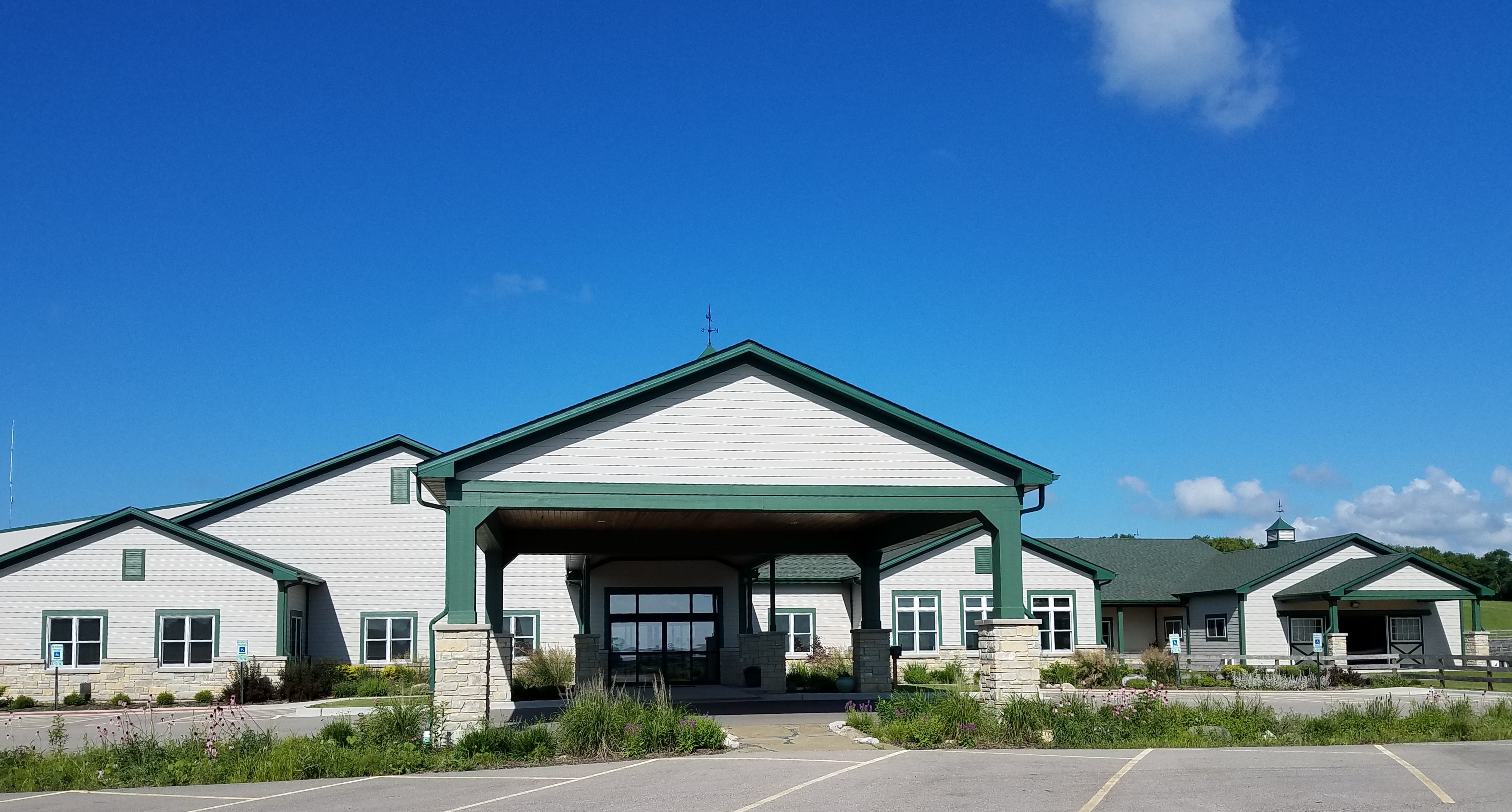
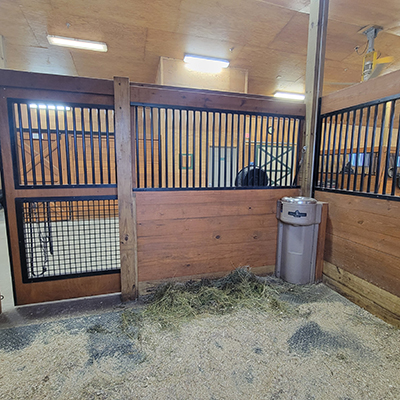
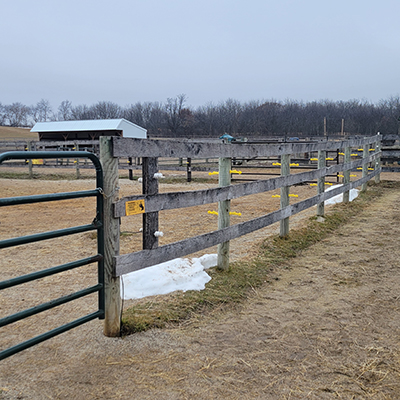
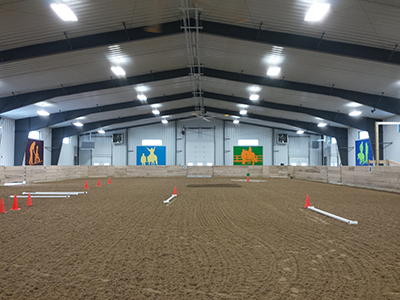
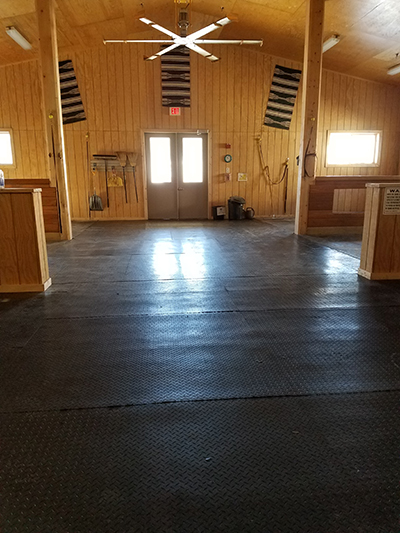
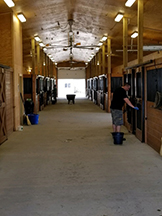
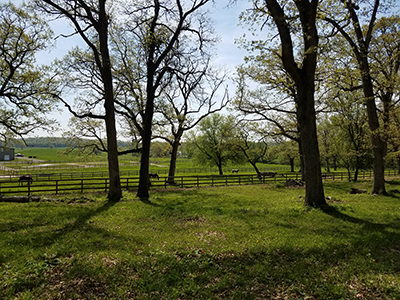
Are the organization's rules, restrictions and warnings (signage) conspicuously posted in easily accessible locations? Yes
Are the organization's emergency contacts, including veterinarian contact information, conspicuously posted in easily accessible locations? Yes
Are human and equine first aid kits easily accessible? Yes
Regarding all shelters where horses are housed including run-in sheds:
Do horses have assigned stalls in the barn/structure(s) or exclusively assigned shelter locations where they are separated from other horses with a barrier? Yes
How many hours per day, on average, are horses stalled or restricted to these sheltered exclusive shelter locations? 0-3;
How often are the stalls/shelters cleaned, i.e., kept in good repair and free of standing water, accumulated waste, sharp objects and debris? 6-7 Days a Week
Do all stalls/shelters allow horses to lie down, stand up and turn around and provide protection from inclement weather (wind, sleet, rain, snow and extreme temperatures)? Yes
Are stalls/shelters kept in good repair, with adequate ceiling height, and free of standing water, accumulated waste, sharp objects and debris? Yes
Are floors constructed and maintained for both good drainage and traction? Yes
Is there a ventilation and circulation system in place to allow free flow of air to control temperature, and humidity, and to prevent air stagnation? Yes
Is wiring inaccessible to horses and maintained for safety in all areas of facility? Yes
Are fire prevention/protection measures (fire alarms, extinguishers and sprinkler systems) maintained and in good working order? Yes
Is there adequate lighting to ensure safety in all areas of facility? Yes
How many hours per day, on average, are horses turned out:
Equines are out 24/7 except they are brought in to feed
Equines are out 24/7 except they are brought in if there is inclement weather
Equines are out 24/7 except when they are being trained
Equines are out 24/7 except when they are used for the conduct of the organization's programs
The following describes the pastures at this facility:
A dedicated staff person(s) is responsible for pasture management
All pastures are fenced to prevent escape or injury
Electric fencing is used; electric wires or tape fence are visibly marked
Fencing checks, such as broken or missing planks, loose fence posts, exposed or loose nails, detached wires, etc., are done regularly
Pastures are rotated
Pastures have natural protection for equines (i.e., trees)
Pastures have man-made protection for equines (i.e., shelters)
This facility does not have pastures where equines can graze on pasture grass
This facility has a written plan in place for pasture management, which includes guidelines for seeding, fertilizing, irrigation, mowing, dragging, harrowing, manure removal, removal of debris, the control of poisonous plants, and a schedule for cleaning
Barbed wire is used for fencing
The following describes the turnout areas other than pastures at this facility:
A dedicated staff person(s) is responsible for the maintenance of turnout areas
All turnout areas are fenced to prevent escape or injury
Electric fencing is used; electric wires or tape fence are visibly marked
Turnout areas have man-made protection for equines (i.e., shelters)
Fencing checks, such as broken or missing planks, loose fence posts, exposed or loose nails, detached wires, etc., are done regularly
This facility does not have turnout areas
This facility has a written plan in place for the maintenance of turnout areas, which includes a schedule for cleaning, manure removal, and dragging
Barbed wire is used for fencing
The following policies and procedures are in place at the facility to restrict public access and to keep horses safe:
The property owner, staff member or caretaker lives on the premises and ensures that public access is restricted and is responsible for the security of the facility and equines
There is a practice in place to monitor equines overnight
No Trespassing signs are posted
Hold Harmless signs are posted
Authorized Personnel Only signs are posted
Visitors are only permitted at specific times
Visitors are only permitted in specific areas
The property is fitted with motion lights
The property is fitted with a security system that is monitored internally by staff (or the property owner)
The perimeter of the property is fully fenced
A security guard is present at night
By Appointment Only signs are posted.
Entrance gates are locked at night
The property is fitted with a security system monitored by police or a professional service
Equine Care/Emergency Preparedness: Main Stay Therapeutic Farm (*Main) 2026 and 2025 This section is required.
Horse Health Care/Barn Management Records: What system is used to collect and store health/horse care records?
Onsite computer with onsite backup storage system
Onsite computer with cloud-based backup storage system
Our organization utilizes a software application to maintain records
The following items are consistent with our feed management plan and practices:
Equines are provided with individualized feeding plans, including supplements, according to the equine's age, breed/type, condition, size, work level and any health issues, consisting of nutritious food provided in sufficient quantity and access to adequate natural forage, or be fed daily, or as recommended by the organization's veterinarian
Feed plans are determined in consultation with a veterinarian
Supplement plans are determined in consultation with a veterinarian
Equines are fed grain in individual stalls
Staff and/or volunteers are trained in proper feed measurements and protocols and observed periodically to ensure they are feeding correctly
The feed chart is centrally located and updated as needed
The area(s) where hay, feed, grain, and supplements are stored are kept clean, free of debris and chemicals, and protected from weather and other animals in rodent-proof and mold-proof containers and grain bins
Feed, supplements and hay types are clearly labeled
Water sources, i.e., buckets, troughs, automatic waterers, etc. are kept clean, free of contaminants, debris and chemicals, protected from weather and other animals, and be positioned or affixed to minimize spillage.
Medications are kept in a secure area
Equines are fed grain in groups
Is clean, potable water available at all times for all equines? Yes
Hoof Care: How often is hoof care provided for each equine? Every 4-8 weeks and when an issue arises
Dental Care: How often is dental care provided for each equine? Annually and when an issue arises
Horse checks: How often are equines visually and physically checked by personnel at the facility? Every day or 6 days a week
Our organization has the following parasite and fly/insect control protocols in place, including remedies used to control flies and insects:
Our organization follows the parasite control guidelines of our veterinarian, including fecal testing and de-worming
Fly/Insect Control Remedies:
Fly Traps and Tapes
Premise Sprays/Insecticides
Fly Spray Repellent
Fly Masks
Fly Sheets
Fans
The following represent the biosecurity practices in place at facility:
Our organization follows the biosecurity guidelines of our veterinarian
Sick, affected and/or quarantined equines do not have contact with other equines or other animals
The organization has a written biosecurity plan
A specific individual is trained and assigned to care for sick, affected and/or quarantined equines
Restricted access signs are posted at primary points of access to sick, affected and/or quarantined equines
Hand sanitizers are available at all primary points of access to sick, affected and/or quarantined equines
Footbaths are available at all primary points of access to sick, affected and/or quarantined equines
Manure and bedding from sick, affected and/or quarantined equines is removed from the facility - not put in open air piles, and not spread on pastures
Quarantine areas, such as stalls, aisle ways, paddocks, and common areas, are cleaned (and needed, disinfected) after conclusion of the quarantine.
Trailers/vans used by sick, affected and/or quarantined equines are cleaned and disinfected after each use and cleaning takes place away from where equines are sheltered
Equipment used by sick, affected and/or quarantined equines is not shared
Equipment used by sick, affected and/or quarantined equines is cleaned of organic debris and disinfected after each use
Latex gloves, or equivalent gloves, are worn when working with sick, affected and/or quarantined equines
Staff are trained in best practices related to biosecurity
Volunteers are trained in best practices related to biosecurity
Sick, affected and/or quarantined equines are cared for last if the caretaker must also care for healthy equines
Equines are not quarantined on arrival.
The following represent the manure removal practices in place at facility:
Manure is stored in dumpster(s)
Manure is piled in an area where equines are not located
Manure is hauled, sold or given away
Manure piles are composted or spread on pastures
Our organization adheres to the manure management guidelines set by the state, local authorities, and/or our organization's veterinarian
Manure piles are covered
The following steps are taken to help staff and volunteers readily identify each horse on the property:
Equines are assigned the same exclusive stall/shelter location each day
Name plates are located on the stall/shelter location
Photos are located on the stall/shelter location
Equines wear halters with nametags
A notebook or binder with photos and information on each equine is easily accessible
A map/diagram is posted showing the location of each equine with equine names and photos
Equine photos and profiles are available on the website
Team leaders work with new staff/volunteers until they are able to identify the equines
Staff and volunteers are provided with an information packet with equine profiles, including photos and detailed descriptions
Staff/volunteers are provided training on conformation, markings, colors, and breeds
Our organization has the following policies and procedures in place pertaining to tack, apparel and equipment:
Saddles are shared
Saddle pads are shared
Blankets, sheets and turn out apparel are fitted and utilized for each equine appropriate to the equine's needs and the weather conditions
Blankets, sheets and turn out apparel are cleaned regularly as needed
Riding Tack is cleaned only when needed
Riding Tack is inspected for overall working condition before each use by trained personnel
Riding Tack is assessed for fit before each use by trained personnel
Riding Tack is assessed for fit by trained personnel when an equine's body condition changes
Riding Tack is assessed for fit by trained personnel when an equine's disposition changes
This facility enlists the services of a professional saddle fitter at least once a year
Assigned riding tack is clearly labeled
Riding Tack is stored in a climate-controlled location
Helmets are shared
Helmets are cleaned/disinfected after each use
Helmets are replaced after a fall
Helmets are replaced at least every five years.
All equines have specifically assigned apparel, equipment and tack (saddles/bridles if ridden) that is not shared
Bridles are shared
Bits are shared
Blankets are shared
Sheets are shared
Turnout apparel is shared
Halters are shared
Riding Tack is always cleaned after each use
Riding Tack is always cleaned at least weekly
No equines are ridden; saddles, bridles, etc. not applicable.
Emergency Preparedness: Main Stay Therapeutic Farm: *Main This section is required.
The following plans, policies, and procedures are in place at the facility to handle emergencies and address weather related issues, fire safety procedures, and/or any additional hazardous scenarios the facility could potentially experience:
The facility owns or has access to a generator
The facility maintains at least two weeks of hay, feed, shavings and medications
The facility collects and maintains medical information from staff, volunteers, and clients
The facility maintains appropriate liability and/or workers' compensation insurance
The organization has a written emergency preparedness/safety plan (EPP)
Emergency procedures are posted prominently
Local fire department and/or the state's emergency planning department procedures
Medical emergencies for clients, staff, and volunteers
Medical emergencies for equines
Evacuation plans
Power outages
Fire
Natural Disasters - thunderstorm, hurricanes, earthquakes, tornados, etc
Protocols to notify emergency personnel
Building/facility exit plans
Terrorist attacks
The facility follows the specific procedures to help PREVENT emergency situations:
Smoking is strictly prohibited
NO SMOKING signs are posted prominently
Hay is stored away from permanent or temporary structures where equines are stalled
Permanent or temporary structures where equines are stalled are kept free of dust, cobwebs, trash, cleaning rags, and other flammable items
Aisles and doorways are kept clear
Heaters with automatic shutoff settings are used
How often are the following checked or performed?
Fire Extinguishers are checked: Annually
Smoke detectors are checked: Annually
Fence lines are checked: Daily
Turnout Areas are checked: Daily
Sprinkler systems are checked: Annually
Fire drills are conducted: Semi-annually
Review of safety protocols with staff are conducted: Semi-annually
Review of safety protocols with volunteers are conducted: Semi-annually
The Emergency Preparedness Plan is reviewed and updated: Annually
Equine Transportation: 1= Onsite: 1 (1 + 0) + Offsite: 0
3-horse van/trailer with truck:
1 Owned onsite
© Copyright 2018 EQUUS Foundation 1395 3.00